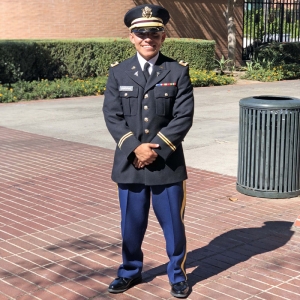MSW Student and National Guardsman Shares His Passion for Military Social Work
December 07, 2018- Students
MSW student Kellin Sandoval is applying his military social work background to accommodate the mental health needs of National Guard service members and connect homeless veterans with critical housing resources.
The U.S. National Guard, established on Dec. 13, 1636, is turning 382 years old this month. In honor of the National Guard’s birthday and the critical role that the armed forces play in ensuring our national security, we’re highlighting the contributions of Kellin Sandoval, U.S. Army second lieutenant in the National Guard and second-year MSW student at the USC Suzanne Dworak-Peck School of Social Work.
USC Suzanne Dworak-Peck School of Social Work: What distinguishes the National Guard from other branches of the military, and what are the specific responsibilities of National Guard service members?
Kellin Sandoval: The National Guard is part of the U.S. military reserve forces. It includes 54 smaller state or territory-operated organizations. As such, members of the National Guard fall under the jurisdiction of both state and federal operations.
Guardsmen are essentially ‘on-call’ to respond to state or national emergencies. This may involve deployment to combat zones across the world or even fighting domestic wildfires like those currently affecting Northern California. Since they may not be called upon to serve on a regular basis, members of the National Guard often hold full-time civilian jobs.
USC: How was your decision to pursue a career in social work influenced by your experience in the military?
KS: After graduating from USC with a bachelor’s degree in international affairs, I enlisted in the National Guard as an Army combat engineer in 2016, where I conducted training in subjects including land navigation, tactical operations, leadership and military knowledge for nonprior service enlistees.
Recently, I was promoted to second lieutenant and have now been assigned as the officer in charge of the 143rd Field Artillery regiment detachment here in Los Angeles. I’ve also recently joined the medical service branch, which means that after my training, I will be able to provide critical mental health services to members of the National Guard and their families. I’ll be in charge of an entire medical platoon, which includes combat medics and military social workers.
My decision to pursue my MSW at USC—and specifically to focus on the military social work track—was influenced not only by my experience in the National Guard but also by my drive to help people. I lost a close friend in the military to suicide, which compelled me to choose a career in which I could address the mental health needs of service members and veterans more directly. Receiving on-the-ground training in military social work through USC and the National Guard has enriched both my experience in the military and in the MSW program.
USC: How has your MSW education prepared you for a career serving military service members and veterans?
KS: My experience at USC thus far has provided me with applicable skills and evidence-based frameworks to effectively serve military service members and veterans—from understanding military transitional services to providing mental health care treatment for PTSD and interventions for issues like substance abuse.
I’m currently interning at the U.S. Department of Veterans Affairs (VA), where I serve at a homeless clinic for veterans who are in the process of transitioning into permanent housing. In this position, I refer veterans to transitional homes and connect them with crucial resources, from addiction counseling to financial planning services, to aid in their transition.
The internship has helped me to put into practice some of the strategies I’ve learned in my MSW education while providing direct insight into the most pressing issues facing veterans in our country. What’s more, my supervisor is a captain in the National Guard, and she has given me valuable advice on pursuing a career in social work while serving in the military.
I truly believe that gaining a deeper understanding of the responsibilities of military social work through my MSW education and my VA internship has prepared me for success in my new role as a medical officer, and in whatever military social work roles I may pursue in the future. My hope is to eventually secure a full-time role at the VA practicing social work.
USC: What advice do you have for those who might be considering a career in military social work?
KS: I believe that if you are passionate about serving vulnerable populations or impacting policy, social work may be a good fit for you. I am encouraging some of my friends in the National Guard to consider pursuing a degree in military social work, because I believe they will find great satisfaction in giving back to our peers who serve this country.
To reference the work of our faculty online, we ask that you directly quote their work where possible and attribute it to "FACULTY NAME, a professor in the USC Suzanne Dworak-Peck School of Social Work” (LINK: https://dworakpeck.usc.edu)
